According to surveys, two-thirds of the population say they are very or fairly worried about being told they have the cancera higher rate than any other medical condition, including dementia and heart attack.
Cancer, despite medical progress, is still scary
The surveyconducted among 2,000 UK adults by Public First on behalf of the University of Cambridge, highlights the concerns people have about a cancer diagnosis. It suggests that late diagnosis, meaning too late to treat cancer, is the biggest worry in relation to a cancer diagnosis (70%) followed by the impact on one’s family and those around them (52%).
When asked what transformative development they would like to see in the future, including the eradication of diseases like malaria, the spread of self-driving cars, and genetically modified crops that enable us to end famine, 55 percent of respondents chose “being able to detect and treat cancer early enough so that no one dies from the disease.” Only the elimination of poverty came close, at 23 percent of respondents.
The University of Cambridge and its partner Cambridge University Hospitals NHS Foundation Trust (CUH) are working to build the Cambridge Cancer Research Hospital, a revolutionary new type of hospital that promises to change the face of cancer.
For the first time, the specialist oncology facility brings together world-renowned scientists within the walls of a new NHS hospital, to detect cancer early and offer patients personalised healthcare and precision cancer medicine.

“Cancer affects one in two people and understandably causes fear in patients and their families,” said Professor Richard Gilbertson, director of the Cancer Research UK Cambridge Centre at the University and head of research at Cambridge Cancer Research Hospital. “People are worried about treatments not working or the side effects being terrible, but also about what the diagnosis will mean for their family.
At Cambridge we believe it is possible to imagine a world where there is no longer any fear of cancer. This is an ambitious goal that we, along with many other researchers around the world, are working hard to achieve.”
When asked what would worry them most about being diagnosed with cancer, the most commonly selected concern was that the cancer would be discovered too late to treat (70%). Some 52% of respondents were concerned about the impact on their family or those around them, 41% were concerned about access to the right treatment, and 36% were concerned about side effects from treatments.
When asked what would make them less afraid of being diagnosed with cancer, 61 percent said, “Knowing that the form of cancer I have is curable.” Again underscoring the importance of early detection, more than half of respondents (51 percent) said, “Knowing that we are better at catching cancer early enough to treat it.”
“Outcomes can be completely transformed – improved survival and less invasive treatments – if cancer is diagnosed early enough,” said Professor Rebecca Fitzgerald, director of the Li Ka Shing Early Cancer Institute at the University of Cambridge.

“That’s why much of our focus now is on understanding cancer in its early stages, years before an individual develops any symptoms. That way, it might even be possible to prevent the disease in the first place, or at least catch it when it can be easily treated.”
According to the survey, it is reassuring to know that many people, including organizations such as the University of Cambridge, are conducting research into how to prevent, diagnose and treat cancer.
A third of respondents (32%) said it would make them less afraid of a cancer diagnosis. And 43% of respondents thought that university cancer research would have a big impact on reducing cancer deaths (although perhaps unsurprisingly, 64% thought the biggest impact on reducing cancer deaths would come from reducing NHS waiting times).
Professor Deborah Prentice, Chancellor of the University of Cambridge, said: “Cambridge is truly at the forefront of transforming our understanding of cancer and the ways we can prevent and treat it.

“This brilliant work will save and transform lives locally, nationally and globally, from the ability to rapidly sequence tumor DNA to the development of groundbreaking new cancer drugs like olaparib. This is world-leading work that makes me incredibly proud.”
The public was asked about their opinion on the use of artificial intelligence (AI) to improve cancer diagnosis and treatment. An overwhelming majority were in favor of its application, with only 8% saying we should not use AI to diagnose and treat cancer. Some 55% thought it was okay to use AI to speed up the search for new treatments, 47% to help a doctor diagnose cancer, and 41% to help a doctor decide which treatment would work best.
At the University of Cambridge, scientists are developing artificial intelligence tools that have the potential to transform cancer treatment by speeding up diagnosis, personalising therapy and reducing costs.
As part of this work, researchers are using artificial intelligence to predict how patients will respond to a particular treatment before they receive it, allowing them to start treatment sooner, target hard-to-treat cancers, and screen for cancers that would currently be prohibitively expensive.

When faced with a series of unwanted future events, a cancer diagnosis is second only to the death of a close relative in terms of greatest concern (64% vs. 72%), ahead of nuclear war (56%), terrorism (53%), and being the victim of a crime (52%).
Surprisingly, older age groups were significantly less likely to say they were “very worried” about cancer than younger age groups: 14% of over-65s compared to 26% of 18-24 year-olds and 29% of 25-34 year-olds.
The University of Cambridge is launching a month-long cancer research insights programme, including a tour of its new hospital, a meeting with researchers studying the early stages of cancer, a look at how artificial intelligence is helping in the fight against the disease, and a meeting with some of the patients who are playing a key role in groundbreaking cancer research.
#Cancer #health #problem #worries #people
